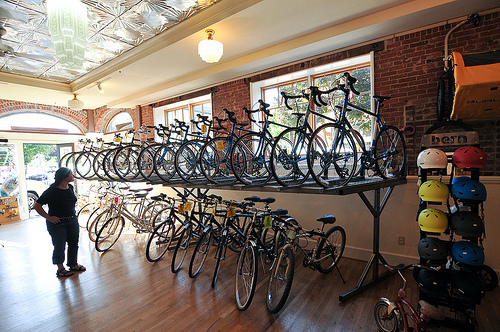Right now in Salem, lawmakers are drafting a statewide transportation funding package that aims to raise over $8 billion. As we reported last week, one small piece of that new revenue — an estimated $2 million a year — would come from a 5 percent tax on the purchase of new bicycles.
The tax would add $35 to the average price of a new bike purchased at a bike shop. It would be an unprecented step for Oregon and the only tax of its kind in America.
Not surprisingly, bike shop owners throughout Oregon are very concerned.
Most of the money raised in the forthcoming bill will be spent on a handful of highway expansion projects that Nigel Jaquiss, a Pulitzer Prize-winning reporter for Willamette Week says, are based on “shaky assumptions about traffic jams”.
“Bikes cannot be the scapegoat here because someone was frustated in their car once.”
— Chris DiStefano, River City Bicycles
While the bike tax will be a relatively tiny portion of the bill; the policy principles and political ramifications go way beyond just a dollar amount (our neighbors in Seattle, for instance, worry it could normalize bike taxes). Perhaps this is why the policy director for The Street Trust, Gerik Kransky, told us he feels the bike tax debate is, “the toughest political challenge” the organization has faced in his seven-year tenure.
As pressure to fund transportation builds in Salem, The Street Trust is playing a risky game: They support the overall package (along with the Transportation for Oregon’s Future coalition) while at the same time they oppose the bike tax that lawmakers see as a key element of it. The Street Trust has also organized opposition to the bike tax from Oregon bike industry leaders.
20 Oregon-based bike business owners and employees have signed a letter drafted by The Street Trust that will be sent to lawmakers later this week. Here’s an excerpt:
“We write to you as business leaders in Oregon’s bicycle industry and as partners in finding solutions to our state’s transportation and infrastructure needs. As Oregon businesses and taxpayers, we support a balanced transportation funding package that includes significant Safe Routes to School and bicycle investments, both on our roadways and on dedicated bike and pedestrian pathways.
We are happy to see the legislature exploring a variety of funding options. As users of our transportation network, we embrace our role in helping pay for our transportation needs through the gas tax, vehicle registration fees, payroll tax, and other tax dollars, all of which we pay currently. However, we are concerned by discussion of a new bicycle excise tax, as we believe it would negatively affect Oregon’s bicycle industry.”
The letter goes on to cite the $440 million of economic impact and 2,645 jobs generated by Oregon’s bicycle industry. Despite that monetary strength, the letter states that many bike businesses operate on “slim profit margins with a fine line between success and failure” and that, “a bicycle excise tax would have a negative impact both on bicycling and on our businesses.”
This nascent bike industry lobby is pushing for alternatives to the bike excise tax. They include:
- Additional motor vehicle taxes or registration fees;
- An optional checkbox on the state tax return to donate to trails;
- A tire tax for all vehicles (including bicycles) that would correspond with usage like a gas tax; or
- Another revenue mechanism that would be more widely distributed and not target a specific industry.
We wanted to hear directly from local bike shop owners. Last week we emailed about a dozen of them. For good measure we reached out to the president of the National Bicycle Dealer’s Association. Here’s what we heard:
Advertisement
Nathan Roll – Metropolis Cycle Repair
The more I think about it, the angrier it makes me. We already don’t make a ton of money off bike sales, and dealing with the cash flow and inventory issues stocking them creates means a tax might be the final straw that persuades me not to sell them at all, and instead concentrate on service and accessory sales. We all know the ‘cyclists not paying their way’ canard is total horseshit, and much like mandatory helmet laws, this is likely to hurt ridership. Additionally, much like the equally ill-starred bicycle license narrative, how are they planning on enforcing this? Won’t any collection and enforcement mechanism eat up most of the money collected? I’m sure Republican lawmakers will be quick to decry this big government money grab. Also, I’m certain the legislature will be rigorously enforcing internet sales of bikes shipped to Oregon for tax enforcement, correct?
Leah Benson, Gladys Bikes
– Personally, I think we should be incentivizing bicycling for its public health and environmental benefits rather than taxing it.
– I don’t agree with the underlying argument that cyclists are somehow a group separate from everyone else. People who ride bikes sometimes also drive…or take public transit…or walk…or… Yet, the notion that “cyclists need to pay their fair share” relies on this false assumption.
– A big concern is that this bill leaves more questions than it provides answers. Will the tax be on complete bikes only? Will the tax apply to online sales from out of state companies selling to Oregon buyers? Will people who live out of state that purchase bicycles from Oregon businesses — esp. thinking of frame builders here — be taxed? Why are bikes taxed at 4%, while cars are taxed at 1%? Etc, etc.
– I’m not going to pretend that adding a tax onto the price of bikes would somehow be a boon for business, but in the (hopefully unlikely) event that this does come to fruition I suppose have to be confident that we’ll ultimately adapt and find a way forward. If I’ve learned anything, it’s that constant change is a given in this industry (and life in general, I suppose) and the ability to roll with it is a must.
Chris DiStefano – River City Bicycles
[Note: River City co-hosted (with The Street Trust) a roundtable discussion about the tax with local bike industry leaders on May 2nd.]
At first, I wanted to have a positive approach to this. To participate in a meaningful conversation and not just dig in our heels and say, ‘We’re bikes! We’re different!’. I wanted us to say, ‘We’ll consider it, we’ll be smart and we’ll listen.’ That’s how it works to earn political capital… being open to every possibility and having a smart approach to it.
Then I heard it would be a 5 percent tax and wouldn’t be on bikes under $500. No way. 75 percent of bikes sold nationally are sold at big box stores [where all the bikes are under $500] — they’re not going to get a free pass. Regardless of cost, it’s the same bike on the same roadway.
The way it looks now, it’s a tax paid by bike shops. A bike from a big box retailer like Target or Walmart would be taxed about $6. But a bike shop like ours would see an average tax of $45-50. Do I believe that will impact business? Yes.
I just disagree with the whole, ‘bikes have to pay their fair share’ thing and I’m not going to allow someone to say this is an excise tax when this is a sales tax. Bikes cannot be the scapegoat here because someone was frustated in their car once.
Erik Tonkin – Sellwood Cycle Repair
A 5 percent tax on new bike sales would be significant. A quick look at our numbers suggests that our business would generate a maximum of $50,000 in revenue if all bike purchases — both new and used — were excised at a 5% rate [note: the proposal would only tax new bicycles]. I suppose the legislative intent is to pass this onto the consumer at the point if sale, but I think of protecting my customers first — so I can’t help but look at this from such a perspective, meaning my head and heart immediately make me wonder if I could afford to cover the excise. That much money is roughly what an average full-time employee costs our business. That’s a useful way to look at, in my opinion.
I don’t really think taxing bikes is a good way to raise money for bike-specific infrastructure projects. For one thing, it just doesn’t seem like much revenue. Second, an excise often functions as a “sin tax”. Such taxes seem to work best when levied in order to discourage “use”. The gas tax and cigarette tax are there, in part, to discourage what are considered damaging and unhealthy activities. Driving is not in and of itself a bad thing, but its associated costs are, at least, infrastructure-related. Smoking’s associated costs are health-care related. The one activity has impact on another entity–the tax is there to connect the activity to where it has its impact. It doesn’t seem wise to make bikes sinful when they can actually offset problems caused by driving cars–the sin tax equation doesn’t solve itself here.
It’s hard for me to put bikes in the sin category! That said, if the current climate in Salem — and in D.C. — is that bikes and those who use them have to start paying their way, then so be it. We need to address this reality, look at ways to “put skin in the game”. For me, this issue reminds me that we have an industry-wide identity crisis. Are bikes transportation or recreation? They’re both, in reality. They are not one or the other only when convenient for us.
In Oregon there’s a basic fishing license. Then, there’s an additional salmon and steelhead “tag” — and that revenue is earmarked, I believe, for that specific fishery, its habitat, etc. This is an imperfect and incomplete thought, but such an additional “bike tag” could be paid for in addition to vehicle registration at the DMV. Of course, there’s always the idea of a “bike license”, too. I suppose these go hand-in-hand.
The tax I’m most fascinated by now is Portland’s art tax. It seems so imperfect and flawed at the surface-level, but it also seems to be working. I wonder if something like that but writ statewide — and possibly graduated — could work for bikes and pedestrians. I’d likely pay such a “bike-‘n-ped” tax each year to get this ball rolling. Bikes are a huge part of our state’s identity — as are beer, coffee, etc.
Joe Doebele – Joe Bike LLC
— The tax panders to a false assumption that a lot of people have: that cyclists don’t pay for the roads they ride on. Most cyclists have cars and pay all the taxes everybody else pays, yet the wear and tear they put on infrastructure when is much lighter. They’re also part of the solution to traffic congestion, especially when there’s separated infrastructure. In lending credence to a public misperception, they’re only going to ingrain the idea that cyclists should shoulder more and more of the burden. It fosters an us vs them mentality and may make drivers feel entitled to insist that cyclists “go ride somewhere else”. Instead, we should better educate the public about who pays taxes, who creates congestion, who damages the roads and bridges.
— The funds are earmarked specifically for bikes-only infrastructure such as trails and paths. That’s got an element of fairness to it. But, by analogy, do we then tax wheelchair sales so that people with handicaps can cross the street without falling off a curb? Do we stop funding any cycling infrastructure if the tax on bikes doesn’t proceed?
— The state proposes to lump bike sales into the category of vice taxes: alcohol, tobacco, weed, gambling…and bicycles. Which one of these things does not belong with the others? This is the inverse of the principle that you tax activities you want to discourage, not ones that are good for society.
— The tax will generate less revenue than expected as people turn to used bikes. Of course, bike shops can also turn to selling used bikes, which may be what we’d do. I’ve got nothing against giving new life to old bikes and putting them back into top shape.
— If the tax applies to out-of-state customers, it will kill our burgeoning out-of-state business. I don’t know how the state would tax new bikes sales on Amazon or directly from bike manufacturers, but if they’re not taxes, obviously online sales will just keep on making it harder to stay in business with new bikes.
— Bike shops are being hit hard from several directions. Rising rents in Portland make it harder to afford retail space and raise the cost of living for our employees. So far we’ve been able to keep pace by raising wages, but there’s a ceiling and we’re getting closer to it all the time.
— Incidentally, a few years ago, City Club of Portland recommended a 4% tax on new bike sales. If the state passes this, does that pave the way for the city to follow suit? Are we then going to see 9% taxes on new bike sales?
Lou Doctor – Velotech (parent company of Western Bikeworks)
I don’t believe the proposed bike tax is the right way to raise funds for bike-related infrastructure. It won’t raise much money and is likely to lead to even more people shopping online instead of locally. I’ve suggested that the state add an optional $15 bike infrastructure fee to the state tax return which taxpayers could opt out of if they chose to. The fee could be thought of as a way to ‘crowdfund’ the necessary projects.
Todd Grant – President, National Bicycle Dealers Association:
Would a 5% tax have an impact? Yes. If the average bike sale through a specialty retailer is close to $700 than a tax of $35 on top of whatever else you pay in taxes will certainly cause sticker shock. The impact on retailers in high tax areas has been shown in Massachusetts and New Hampshire where people in Massachusetts that live anywhere near the border of New Hampshire go across the state line to save on the taxes.
In addition to the above, such a tax on a kid’s bike [the proposal would only tax bicycles with 26-inch wheels and larger] might drive that consumer into a big-box store that already has lower starting price points.
Bicyclists already pay their way to use the roads and trails through various licensing, taxes and fees. If the government wants to raise money they should add the tax to the vehicles that have the most expensive infrastructure to build and maintain – cars.
Is there still time to kill the bike tax? Or to swap it out for something that will be more favorable to the bike industry?
The Joint Transportation Preservation and Modernization Committee continues their debate on the funding package today at 5:30 pm. Stay tuned.
— Jonathan Maus: (503) 706-8804, @jonathan_maus on Twitter and jonathan@bikeportland.org
BikePortland is supported by the community (that means you!). Please become a subscriber or make a donation today.








